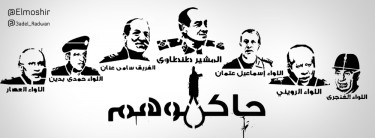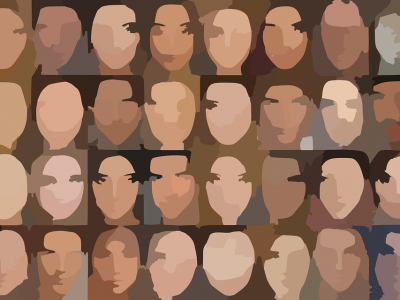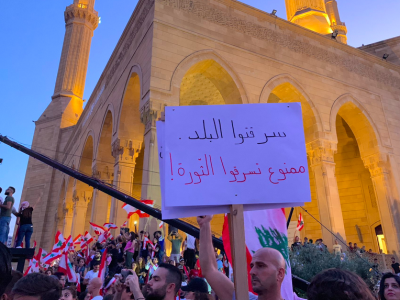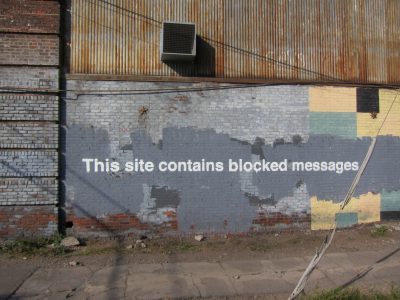Most of this month’s report was researched, edited, and written by Rayna St, Danielle Kehl, Afef Abrougui and Tarek Amr.
Editors’ note: Our first edition of the MENA Netizen Report received an enthusiastic welcome from readers, demonstrating that this regionally-focused report fills an important gap. In addition to the usual sections, this month's edition contains a ‘Worth reading’ paragraph.
Censorship
Tunisia launched the “National Forum on Internet Governance” on September 4, and government officials declared an official end to the country’s censorship policies — known to many as “Ammar 404” — which were notoriously repressive prior to the Arab Spring.
Israeli ISPs are obliged by a new law to offer information on the existence of “harmful sites and content” and provide free tools to their subscribers to be used to filter and block such content.
The Hamas government in Gaza has taken concrete measures to regulate the access to online content: a new law now censors access to websites deemed “pornographic”.
As reported by our colleagues in last week's global Netizen Report, proposed amendments to the Press and Publications Law in Jordan would give the government greater authority to restrict freedom of expression and would oblige websites carrying news content to register with the the authorities and accept liability not only for any content they publish, but also for the comments published by readers. Despite a backlash from journalists and news outlets, the Jordanian government has defended its actions. At the same time, it is facing criticism over censorship after urging ISPs to block porn websites.
The second largest state-run newspaper in Egypt has cancelled the publication of an opinion piece which is allegedly critical to the Muslim Brotherhood. This incident is one of the several notable cases related to what freedom of expression activists and people of the press have dubbed the “brotherhoodization” of the media in the country.
Egyptian newspaper Al Masry Al Youm reported [ar] the official rebuttal of former Muslim Brotherhood Deputy Hassan El-Brens, after information circulated that he had called for the shut-down of Facebook and Twitter as a means to “maintain the country’s stability.”
The Ahlul Bayt News Agency summarizes the current sectarian crackdown on Christians in Saudi Arabia where the Mufti declared the “Saudi Christians House of Peace Organization” unrelated to and non-representative of Saudi society. One of the measures against this organization was the blocking of its website by the Saudi Communications and Information Technology Commission.
News outlet Jurn Al-Jazira reported [ar] that 32,000 sites have been blocked in the UAE. Such an action has not, however, been officially confirmed by the Emirati Telecomunications Regulation Authority.
Thuggery
Bahraini human rights activist Nabeel Rajab has been acquitted of charges for posting an “insulting” remark on Twitter, but sentenced to three years in jail for another charge related to “illegal gathering” (the gathering of five or more people with the intent to protest). Rajab remains in prison despite the acquittal while members of the United States (US) Congress petitioned the Bahraini government to call for his release. Thirteen other human rights activists were harshly sentenced alongside, hardly a month after the Bahraini king Al-Khalifa visited France and “a joint agreement on Bahrain’s access to technical assistance from the French institutions in the field of human rights and judicial reforms” was announced by the Bahraini Minister of Foreign Affairs.
An outspoken critic of Saudi Arabia’s arbitrary detentions and Twitter activist, Reema Al Joresh, was briefly arrested on the day of Eid, August 19, Global Voices’ Osama Khalid reported.
Hamza Kashgari, a Saudi writer and activist, was detained back in February over three tweets deemed blasphemous as he addressed the Prophet Mohammad as an equal. This stirred controversy and heated debate in the country, while Saudi’s highest religious clerics declared him guilty of apostasy and called for a death sentence. Kashgari wrote a poem from jail as a confirmation for his apology, but remains in prison.
Moroccan activist website Mamfakinch! and 2012 winner of the Global Voices Breaking Borders Award continues to be the target of government spyware attacks. The Trojan virus was made to appear as a news scoop, and was identified to remotely activate webcams and take screenshots.
Reporters Without Borders have published an open letter to the Free Syrian Army and the Syrian National Council calling on them to stop the crackdown on pro-regime journalists. The press freedom watchdog continues its work on documenting the alarming number of netizens killed and arrested in the country.
After the massive crackdown on netizens and human rights activists in the UAE we reported on, the Emirates Center for Human Rights reported that four out of the 51 detainees have started a hunger strike. The Center also draws attention to a resumed crackdown with six new individuals arrested and held incommunicado with no official charges against them.
Beshoy Kamel, a Coptic Christian Egyptian teacher, was arrested and held in custody for four days following accusations of spreading blasphemous cartoons on Facebook. According to the person who pressed the charges, the cartoons were also defaming Egypt’s President, Muslim Brotherhood member Mohamed Morsi.
Voices still threatened
Among the voices of netizens under threat are many Iranians, Yemeni investigative journalist Abdul Ilah Haydar Shae, Saudi poet Hamza Kashgari, and Bahraini human rights defenders amongst whom are Nabeel Rajab and Zainab AlKhawaja.
National policy
In Saudi Arabia not only the content of websites can be considered offensive: domain names can also be considered so by officials. ICANN approved the increase of number of domains from the current 22; the applications for new ones thus include strings like “sex”, “porn” and “gay” which Saudi Arabia has submitted objections to.
The Egyptian government is planning to extend the activities of the mostly-state owned Telecom Egypt by granting it an operating license to provide mobile services. The idea has already sparked debates as the government owns the landline phones and fiber optic infrastructure that all operators need to use. The other, privately-held mobile service providers have opposed such a move claiming a saturated market and equal access to Telecom’s fiber optic networks. Ensuring direct or indirect monopoly over the country’s telecommunications creates fears, and critics are suspicious about potential political control arguing that the Internet cut during the January 2011 revolution would have been much more difficult with a diverse and independent array of providers.
Internet Masr [Egypt] Society, a non-governmental multi-stakeholder entity whose goal is to support community action in Egypt in order to spread the Internet as the primary means of enabling society, published a draft describing the General Principles for Internet Usage [ar]. They have also called for individuals and members of civil society to submit additions and comments. You can follow them on Twitter and Facebook [en, ar].
The Egyptian Organization for Human Rights released a report [ar] entitled ‘Intellectual Terrorism and the Policy of Censorship’ which focuses on the state of media freedom in the country since the January 25 revolution. EgyptSource’s Nancy Messieh lists the ten recommendations the report makes to improve the situation in Egypt, with respect to freedom of the media regardless of its support (written, electronic, visual, audio) and more concrete efforts in favor of the open access to information and legislative transparency.
The Iranian government is planning to move key ministries and state bodies off the worldwide Internet, a manoeuvre officially motivated by the government’s desire to protect their assets from cyberthreats. Such an action may constitute a step of Iran’s plan to replace the global Internet with a domestic intranet system later on, a possibility opponents have previously denounced as a means of dwelling western influence along with further tightening already stringent online surveillance of activists and regime critics.
Activists notify that sanctions aimed at the Iranian and Syrian regimes are double-edged swords making it harder for the opposition to access online services and security tools that prevent user activity from being traced. Syrian activist Dlshad Othman has launched a petition to call on the US Commerce and Treasury Departments to ease current sanctions in order to help Syrian activists share information online more safely.
Although US President Barack Obama has imposed sanctions against Syrian telecommunication companies since April, Syria’s largest ISPs have sidestepped the sanctions. The Internet bandwidth is mainly provided by China in the case of the Syria Telecommunications Establishment (the entity controlling the country’s Internet infrastructure) and by US-based companies.
Netizen activism
After spectacular reshuffling of Egyptian military top ranking officers, activists have launched a campaign calling for them to be tried. “No Safe Exit” is one of its leitmotifs as President Morsi honoured the officers.
Tunisia’s Nawaat reports that a local group of cyberactivists decided to sue the Interior Ministry over the use of “Ammar404”, the tool used by the former regime to monitor and censor the web.
On August 29, over 500 websites in Jordan went dark to protest censorship (#BlackoutJO and #FreeNetJO) critics have argued that recent events will be bad for Jordan’s burgeoning IT industry, with a number of companies already talking about closing their offices in Jordan as a result of the government’s actions. The protest was accompanied by a wide number of explanatory resources [en,ar].
Cybersecurity
News agency Reuters encountered a third cyberattack in August, which resulted in an article claiming the death of Saudi Arabia’s Foreign Minister Saud al-Faisal. The two previous attacks resulted in the posting of messages in favor of Syria’s president Bashar al-Assad and his regime. Human rights watchdog Amnesty International also suffered a similar cyberattack at the end of August when readers of its blog Livewire witnessed a post entitled “Amnesty Calls on UN to stop the US, Qatar and Turkey funding and arming Syrian rebels.”
An Israeli information security company announced the identification of over 150 new victims of the Mahdi Trojan, bringing the total number of infections to nearly 1,000. According to their analysis, the scope of the cyber-espionage campaign against Iran has broadened to encompass other countries in the region.
Syrian pro-government hackers have been reported to target activists with a fake anti-hacking tool. A worrying number of journalists and members of the opposition have thus become the targets of covertly installed surveillance malware on their computers.
Sovereigns of cyberspace
Google has allegedly censored a (left-wing) Israeli political campaign against a recent decision by the Ministry of Finances to grant important tax breaks to large multinational corporations.
Surveillance
Gamma’s spyware FinFisher continues to be uncovered in more and more devices: this time, security researchers have detected it in a broad range of smartphones. This surveillance tool is known to collect images, record Skype chats and log keystrokes, and was first discovered in Bahraini activists’ computers. The tech activist group Telecomix has been consistently collecting a huge amount of information on Gamma and its activities through their Blue Cabinet initiative.
Earlier this year, a human rights NGO filed a complaint against the French tech company Qosmos for selling surveillance software to the Syrian regime. French newspaper Le Monde reported [fr] that Qosmos filed a complaint for “libellous accusations” as a response to the complaint.
Privacy
Global Voices author Afef Abrougui discusses the currently reviewed privacy law in Tunisia. The law, passed back in 2004 under the reign of former potentat Ben Ali, ensured no protection for journalists and activists whose online activities were thoroughly monitored. The amendments to be introduced aim at regulating the use of personal data by official administrations.
Cool things
The Tunisian government has launched an Open Data website [ar] to enhance transparency. The portal seeks to provide netizens with access to public data, and give them the opportunity to download and make use of such data.
In Egypt, the Constituent Assembly launched Sharek (“participate” in Arabic) [ar], a crowdsourcing initiative through which citizens will be able to help draft the new constitution of their country. Egyptians can now send their suggestions or propose constitutional clauses online, via phone or post.
Lebanese organization MARCH launched the Virtual Museum of Censorship, on online database of censorship cases in Lebanon ever since the country's foundation in 1943.
The Global Entrepreneurship and Maker Space Initiative (GEMSI) seeks funding to organize two hackerspace events in Baghdad next October.
Worth reading
Independent research ezine Jadaliyya discusses in details the “e-militias of the Muslim Brotherhood” or “how to upload ideology on Facebook.”
Tunisian media outlet Nawaat publishes a detailed account of a study on how Twitter has been used by activists.
Subscribe to the Netizen Report by email
For upcoming events related to the future of citizen rights in the digital age, see the Global Voices Events Calendar.





1 comment